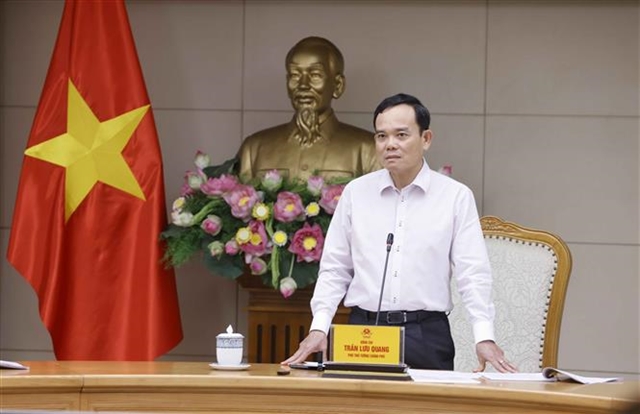
|
| Deputy Prime Minister Trần Lưu Quang at the meeting. — VNA/VNS Photo |
HÀ NỘI — Deputy Prime Minister Trần Lưu Quang on July 17 requested the acceleration of the implementation of a project to develop one million hectares of specialised rice cultivation with high quality and low emissions associated with green growth in the Mekong Delta region from now to 2030.
Speaking at a meeting on the project implementation progress in Hà Nội, Quang emphasised that it creates a new production method suitable for the world’s production and consumption trends; and generates a breakthrough in agriculture thinking in the Mekong Delta, which is facing the effects of rapid and unpredictable climate change, thus contributing to improving the income and living conditions of farmers and businesses, and helping Việt Nam realise its goal of achieving net zero emissions by 2050.
Agreeing with the opinions on the need to have the engagement of authorities in the central level, localities, farmers, and businesses in implementing the project, the Deputy PM required the Ministry of Agriculture and Rural Development (MARD) to keep the coordinating role, proactively handle the work under its authority, and report to the Prime Minister on issues beyond that.
Regarding borrowing loans from the World Bank (WB), the ministry must clarify investment items and work contents to ensure consistency, no duplication, and no overlap with other projects underway in the region, Quang added.
MARD Deputy Minister Trần Thanh Nam told the meeting that to carry out the project, his ministry has established a steering committee to oversee the project implementation. This committee includes representatives from the Ministry of Planning and Investment, the Ministry of Finance, the Ministry of Natural Resources and Environment, the State Bank of Vietnam, the World Bank, and 12 Mekong Delta localities.
The ministry has developed a technical process for producing high-quality, low-emission rice in the region and a plan to enhance capabilities for partners and agricultural cooperatives in developing value chain linkages under the project. It has also collaborated with localities to review the current status of production areas, infrastructure, production organisation and farming practices, and assess the situation of cooperatives in the Việt Nam-Sustainable Agriculture Transformation Project in the 2015-22 period.
Currently, the MARD is working with the WB and the 12 localities to finalise a loan project on infrastructure and technical support for high-quality, low-emission rice in the Mekong Delta region, Nam said.
According to the official, the ministry has implemented seven pilot models in Cần Thơ City, and Đồng Tháp, Kiên Giang, Trà Vinh, and Sóc Trăng provinces.
Initial assessments show that the rice farming model under the project during the 2024 Summer-Autumn crop in Cần Thơ has yielded positive results. Input costs have decreased by 10-15 per cent, including those in seed, fertilisers, and irrigation water. The yield of the pilot model ranged from 6.13-6.51 tonnes per hectare compared to 5.89 tonnes per hectare in the normal one, while its profits reached VNĐ21-VNĐ25.8 million (US$830-$1,020) per hectare, surpassing the normal model by $1.3-$6.2 million per hectare.
Moreover, the pilot model contributed to reducing CO2 emissions by 2 tonnes per hectare compared to the model that removes rice straw from the fields and by 12 tonnes hectare compared to that practicing rice straw burial after harvesting. Importantly, many businesses have committed to purchasing all rice produced under these pilot models.
As Việt Nam is the first country in the world to have a large-scale project on rice production towards sustainable growth and emissions reduction, it is facing a lot of difficulties, Nam said, proposing the Government submit to the National Assembly a resolution to pilot certain specific policies regarding the use of official development assistance (ODA) and concessional loans from foreign donors during the legislature’s plenary session in October.
Additionally, the ministry recommended that the Government allow the ministry to collaborate with the Asian Development Bank (ADB) to prepare a project for a $270-million loan and to support the implementation of the project. — VNS
- Reduce Hair Loss with PURA D’OR Gold Label Shampoo
- Castor Oil Has Made a “Huge” Difference With Hair and Brow Growth
- Excessive hair loss in men: Signs of illness that cannot be subjective
- Dịch Vụ SEO Website ở Los Angeles, CA: đưa trang web doanh nghiệp bạn lên top Google
- Nails Salon Sierra Madre
 VnExpress News The News Gateway of Vietnam
VnExpress News The News Gateway of Vietnam




